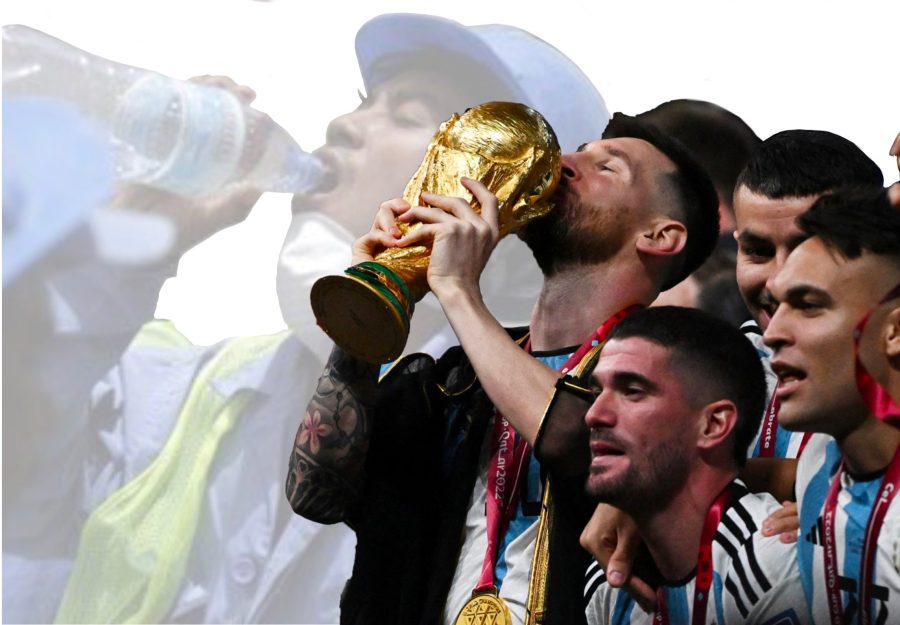More than just a game
How sportswashing came into play at the World Cup
Sportswashing covers up and erases the problems faced by the country.
January 3, 2023
“While we have a moment, just want to say thank you to the country of Qatar: What a wonderful host they have been, so hospitable, so friendly, so welcoming,” FOX Sports news anchor John Strong said. “They put on an amazing presentation of stadiums so close to one another it was almost as if the World Cup was held in a city rather than a country, and there are people out there who made every game.”
As the players and match officials were awarded with medals, Strong gave a seemingly warm thanks toward the host country, but unknowingly revealed the problem that plagues Qatar — that this is a brilliant “presentation,” a carefully crafted facade that hides the true issues Qatar faces.
Qatar, a Middle Eastern nation, stepped into the global limelight in 2022 as the first Arab nation to host the FIFA World Cup 2022 despite never having qualified for a World Cup before. The nation didn’t have the infrastructure in place necessary to hold the event, and had issues surrounding human rights violations of migrant workers.

In the lead up to the FIFA World Cup, Qatar spent the past five to six years building seven stadiums for the World Cup games, since only one previously existed in the small nation. However, the many migrant workers who were employed to build these stadiums often faced poor living conditions and lack of proper compensation. In fact, more than 6,500 migrant workers building the stadiums in Qatar died in the process.
It’s these issues that turn Qatar’s hosting of the World Cup into “sportswashing” — defined as the practice of using sports events to improve a country’s reputation and direct attention away from controversy. By hosting the World Cup, Qatar has shifted public attention away from accusations about human rights violations to the glitz and glamor of the most-watched sporting event in the world.
While manual labor laws have changed, it doesn’t take away from the fact that people lost their lives. And what’s worse is that FIFA doesn’t seem to care. In a letter that was sent prior to the tournament, FIFA told the nations participating in the World Cup to “focus on football” and to “not allow football to be dragged into every ideological or political battle that exists.”
But sports are undeniably linked with the people, countries and policies surrounding them. To say otherwise is to ignore the 6,500 lives lost these past years, the political tensions that run high in the present and the corruption that will continue to run rampant in the future.
No soccer player or fan needs to use their platform to fight a political battle. They don’t even need to take a political stance. But when countries fail to acknowledge these human rights violations, the government corruption goes beyond politics and becomes a matter of basic human rights.
The nature of sportswashing isn’t black and white. There’s no right or wrong when considering whether fans should support teams that represent corrupt countries, no definitive answer to whether a country should be allowed to host or not. The ethics and morality surrounding these decisions are personal, and it’s impossible to judge people’s or committees’ decisions without understanding the context behind them.
But both participants and fans of the World Cup should at least recognize the host country’s unethical actions — discussing uncomfortable topics in sports will be a difficult change, but a necessary one. Because refraining from any political conversations will do more harm than good, and in a world where politics has ingrained itself everywhere whether we like it or not, to stay silent is to be complicit in their actions.
 During the World Cup, many of us watched the games with our eyes glued to the big screen and hands gripping the edge of our seats. We yelled when Brazil lost, gasped when Morocco advanced to the semi-finals and cheered when Argentina won the final in penalties. However, as avid watchers, the least we can do is educate ourselves, not only about the number of goals a player has scored or how many kicks a goalie has saved, but also about Qatar’s human rights violations.
During the World Cup, many of us watched the games with our eyes glued to the big screen and hands gripping the edge of our seats. We yelled when Brazil lost, gasped when Morocco advanced to the semi-finals and cheered when Argentina won the final in penalties. However, as avid watchers, the least we can do is educate ourselves, not only about the number of goals a player has scored or how many kicks a goalie has saved, but also about Qatar’s human rights violations.
If anything, in an ironic twist on sportswashing, perhaps this controversy will help shed some light on the very issues countries are trying to hide and bring up conversations that are long overdue. Yes, we can shower our favorite players with support and still denounce the event as a whole. We don’t have to choose one or the other — we can cheer when Messi’s World Cup career culminates in a stunning victory and discuss the implications of Qatar’s human rights violations.
When there are people dying, educating ourselves is the least we can do.




















